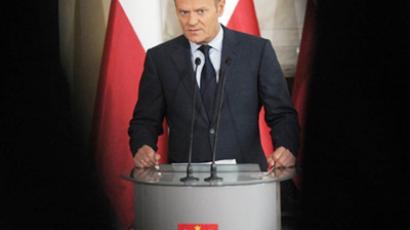Air traffic control transcripts on Kaczynski plane crash released

The IAC has made public transcripts of air control voice conversation, at the Severny military airfield in Smolensk, that preceded the plane crash of the Polish delegation on April 10, 2010.
ollowing the accusations from the Polish side of incompetent actions of Russian air traffic control in Smolensk on the day of Poland’s presidential plane crash, the Interstate Aviation Committee (IAC), which is the CIS’ highest authorized body to investigate plane crashes in the former Soviet republics, has published transcripts of all radio and telephone records of communication by Smolensk air traffic controllers prior to the disaster.As the Polish side said that it was going to publish the transcripts itself, the Russian side took the decision to publish them first to avoid any manipulation of the conversation records.Poland's parliament is to gather later on Wednesday to discuss and review in detail the final report on last April's crash in western Russia, which killed Polish President Lech Kaczynski.The official findings of the Moscow-based Interstate Aviation Committee cited the crew’s refusal to use a different airfield in bad weather conditions and the pressure of the high ranking officials in the cockpit as the main reasons for the tragedy.So far there has been mixed reaction to the report from Poland. Prime Minister Donald Tusk has been relatively diplomatic amid the anti-Russian rhetoric of the current Polish President Bronislaw Komorowski. Warsaw says the report is 'incomplete' and the reaction of the Polish parliament is expected to be less than positive.The twin brother of the late Polish President, Jaroslaw Kaczynski, and Lech Kaczynski’s daughter Marta have blatantly blamed Russia for the plane crash that killed the president and 95 of Poland’s top officials.The Polish Minister of Interior and Administration Jerzy Miller and other Polish officials have expressed their opinion on Tuesday putting blame for the disaster on the Russian air traffic controllers, stressing that the controllers should have denied the landing of the Polish Air One in Smolensk – something they could not actually do according to international regulations.The published transcripts show that the controllers more than once suggested to the Polish crew to go for an alternative airfield.The IAC’s decision to publish the full transcripts of the control tower conversations with the Polish plane is unprecedented. Usually, such documents are confidential due to many reasons, including the moral aspect and the swearing of those in the emergency situation.But considering the utmost importance of the investigation, this publication will likely add up to the evidence needed for the Polish side to prove that the findings of the IAC are accurate – and experts around the world have already confirmed that.Extract from the transcript of communication between pilots of the Polish president's plane and the control tower of Severny military airfield in Smolensk.Pilot: "What are the weather conditions?".Controller: "Fog, 400 meters visibility".Pilot: "Temperature and pressure, please."Controller: "Temperature's plus 2, pressure's 7-45, 7-4-5, there's no opportunity for landing."Pilot: "Thank you, but if it is possible, we'll try a landing approach weather permitting, if not, we will proceed to the second circle."Controller: "101, will you have enough fuel for the second circle after the landing approach?"Pilot: "Yes, we will."Controller: "Making a landing approach, it's the captain's decision, there are 100 meters before you have to make a decision, Minsk readiness, Vitebsk will be requested for a side-track… Have you ever made a landing at a military airfield?"Pilot: "Of course."Controller: "Polish 101, at 100 meters be ready to proceed to the second circle."Pilot: "Yes, sir. Flaps and wheels down."Controller: "Flight control, horizon. Make a second circle."Controller: "Make a second circle. Make a second circle."Controller: "Where is it? Make a second circle, 101."Controller: "Call emergency crews."Link to the IAC official website with the published transcriptions, all documents in Russian, PDF format.
Aviation security expert Chris Yates of the UK-based Yates Consultancy says Poland's independent investigation cannot possibly find any new facts about the tragedy – the final report has already detailed everything:“The Interstate Aviation Committee as far as I can see has done a perfect job of this investigation. We have all of the evidence before us now. And I can’t see that if the Polish side decide to carry out another investigation the results will be any different to what we’ve seen. The evidence is the evidence. It is hard evidence. It is factual. And, you know, we simply can’t change that with yet another investigation into the event.”
Speaking on the release of the transcripts, deputy director of the Yeltsin Foundation Evgeny Volk believes the conclusions reached by the Polish side will not differ greatly from the outcome of the Russian investigation. “But there will be certain differences and emphasis on the responsibility of the Polish pilots, and the responsibility of the Russian side… I believe that the Polish side will be inclined to blame also the Russian air traffic controllers for some mistakes and for mismanagement of the situation,” Volk adds.The transcripts are not that significant for the incident, Volk believes, but the incident has become a big political problem in relations between Russia and Poland. “It [the problem] is a hostage of the historical heritage between Russia and Poland, which is certainly aggravated by numerous wars, bloodshed and mistrust. Whatever is presented by the Russian side, whatever is presented by the Polish side will always be interpreted through the prism of this historical mistrust,” Volk says.
Ahead of the parliament's reaction, Roman Kuzniar, an aide to the Polish president, admitted that it is a challenge for Poles to accept the real reasons for the tragedy."It is hard for Poles to handle a difficult truth, and this is a difficult truth. We, of course, are looking for some things in this report, which help us to shift some responsibility away from us about this situation,” he said.“There are three elements that make it hard: the psychological difficulty on our side, the fact that it occurs within the context of Polish-Russian relations, plus there is an internal political war in Poland. These things do not allow us to speak about this issue objectively, nor present any solid conclusions,” Mr. Kuzniar explained.













